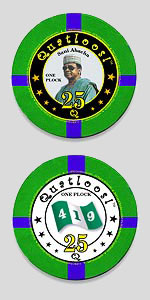Quatloos! > Advance
Fee > Exhibit:
Nigerian 4-1-9 Scam > Internet
Rekindles 'Nigerian Scam'
By CHRIS DETTRO
STAFF WRITER -Springfield State Journal Register
The popularity of the Internet has brought with it a resurgence of a fraud
scheme generically known as "advance fee fraud" and more commonly
called the "Nigerian scam."
Versions of the scheme have circulated since the 1980s, but the Central Illinois
Financial and Cybercrime Task Force has recorded a recent increase in central
Illinois consumer complaints.
"The Nigerian scam is just one example of many," said Jack Fox,
resident agent in charge of the Springfield office of the U.S. Secret Service. "There
is so much of it now it is just ridiculous. The advent of the cyberworld has
kind of rekindled it to like it was in the mid-'80s when it was running big
time."
He said the perpetrators of the schemes have changed their focus from letters
to the Internet and have changed the wording of the communications somewhat.
Advance fee fraud, known internationally as "4-1-9 fraud" after
the section of the Nigerian penal code that addresses fraud schemes, can take
many forms to entice potential victims to help the scammer with transferring
millions of dollars from a foreign country, often Nigeria, to the United States.
The victim is promised a share of the money after providing financial assistance
of some sort to the perpetrator.
A typical scheme begins with an unsolicited letter or e-mail from an "official" representing
a foreign government or agency, many times the Nigerian government or its military.
The letter or e-mail contains an urgent request for help in transferring millions
of dollars from Nigeria to the victim's personal bank account with the victim
to receive a percentage of the funds in exchange for his or her assistance.
The communication stresses a need for secrecy to prevent corrupt officials
from seizing the money for themselves.
But as the scheme unfolds, the perpetrators relate various problems with transferring
the money and ask the victim to provide up-front advance funds to cover transaction
fees, taxes or bribes.
"It's very rare that they'll meet with a potential victim in the U.S.," Fox
said.
The perpetrators get the names of potential victims from a variety of sources,
including trade journals, professional directories and newspapers. They use
elaborate means, including official-looking documents with government seals
and logos to convince their victims of the plan's legitimacy.
"It's an individual's greed that allows them to become a victim," Fox
said. "It's like winning the lottery and you didn't even have to buy a
ticket." Most of the unsolicited letters and e-mails are discarded or
ignored, law enforcement officials say.
However, people continue to fall victim to the schemes, and because their
money is transferred overseas and the fraud is perpetrated in another country,
restitution has proved extremely difficult.
Fox said the Secret Service, which was designated the lead investigative agency
for advance fee fraud in 1998 by the U.S. attorney general, has an office in
Lagos that works with the Nigerian government, but getting restitution remains
a long shot, he said.
Many victims don't report the fraud because of fear or embarrassment. Law
enforcement officials believe the annual losses are in the millions of dollars
nationwide.
Fox said the Secret Service receives reports of three or four cases in southern
and central Illinois each month.
"Central Illinois loses a lot of money," he said. "We're certainly
not immune."
He said in the past few weeks he has seen an increase in cases where the fraud
artists use counterfeit cashier's checks and business checks. He described
one scenario where a person may try to sell a motorcycle with an asking price
of $1,500 over the Internet. The perpetrator responds and agrees to buy the
motorcycle, sight unseen and without arranging for shipping.
"He sends a cashier's check from Europe for, say, $30,000 and wants you
to send him back the change," Fox said. "And people don't even ask
why." The cashier's check turns out to be counterfeit, but the copy is
so good the banks don't catch it until the funds are reconciled, Fox said.
"They (the victim) has the money in hand, and they don't see all the
things wrong with it," Fox said.
Jan Miller, U.S. attorney for the central district of Illinois, said that
information and awareness "are the best tools available to prevent victims
from falling prey to these types of get-rich-quick schemes."
"Generally, by the time the victim realizes he or she has been scammed,
the money has been spent and the damage irreparably done," he said. Through
its Web site and its financial crimes division in Washington, the Secret Service
is the central repository for complaints about Nigerian fraud and is in charge
of educating the public about the forms the frauds take. The Web address, www.secretservice.gov,
gives detailed information about tactics used by "4-1-9" scammers.
People who have not lost money to the scheme but who have received a solicitation
letter may fax the letter to the Secret Service at fax number (202) 406-5031.
Those who have lost money should contact the Secret Service at telephone number
(202) 406-5850 or the local Secret Service office at 492-4033.
The Illinois attorney general's office is among a number of organizations
and government agencies that have established Internet sites to post information
and advisories about advance fee fraud schemes. The attorney general's consumer
warning Internet address is www.ag.state.il.us/consumer/warnings.
Law enforcement agencies participating in the Central Illinois Financial and
Cybercrime Task Force are the U.S. attorney's office, Illinois attorney general's
office, Illinois State Police, U.S. Secret Service, FBI, Illinois Secretary
of State Police, U.S. Postal Inspection Service, Internal Revenue Service,
Springfield Police Department and the Illinois appellate prosecutor's office.










